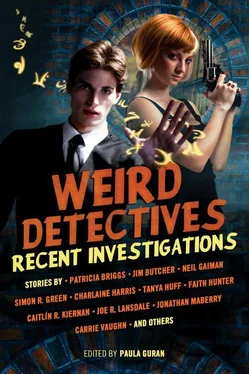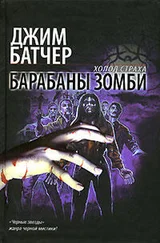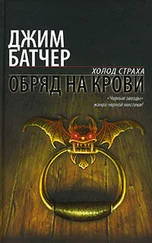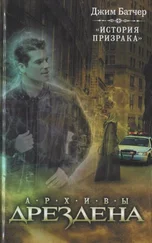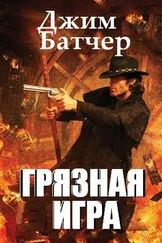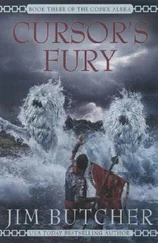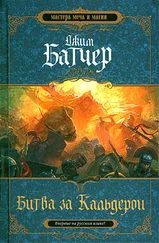Джим Батчер - Weird Detectives - Recent Investigations
Здесь есть возможность читать онлайн «Джим Батчер - Weird Detectives - Recent Investigations» весь текст электронной книги совершенно бесплатно (целиком полную версию без сокращений). В некоторых случаях можно слушать аудио, скачать через торрент в формате fb2 и присутствует краткое содержание. Год выпуска: 2013, ISBN: 2013, Издательство: Prime Books, Жанр: Детективная фантастика, на английском языке. Описание произведения, (предисловие) а так же отзывы посетителей доступны на портале библиотеки ЛибКат.
- Название:Weird Detectives: Recent Investigations
- Автор:
- Издательство:Prime Books
- Жанр:
- Год:2013
- ISBN:9781607013990
- Рейтинг книги:5 / 5. Голосов: 1
-
Избранное:Добавить в избранное
- Отзывы:
-
Ваша оценка:
- 100
- 1
- 2
- 3
- 4
- 5
Weird Detectives: Recent Investigations: краткое содержание, описание и аннотация
Предлагаем к чтению аннотацию, описание, краткое содержание или предисловие (зависит от того, что написал сам автор книги «Weird Detectives: Recent Investigations»). Если вы не нашли необходимую информацию о книге — напишите в комментариях, мы постараемся отыскать её.
Weird Detectives: Recent Investigations — читать онлайн бесплатно полную книгу (весь текст) целиком
Ниже представлен текст книги, разбитый по страницам. Система сохранения места последней прочитанной страницы, позволяет с удобством читать онлайн бесплатно книгу «Weird Detectives: Recent Investigations», без необходимости каждый раз заново искать на чём Вы остановились. Поставьте закладку, и сможете в любой момент перейти на страницу, на которой закончили чтение.
Интервал:
Закладка:
Weird Detectives:
Recent Investigations
BEYOND RATIOCINATION, REASON, GUMSHOES, AND GUNS: WEIRD DETECTIVES
Paula Guran
The subgenre that came to be known as “urban fantasy” was the most popular type of fantasy—perhaps fiction as a whole—of the first decade of the twenty-first century. Although full of action-adventure and horror’s supernatural beings—vampires, werewolves, shapeshifters, ghosts, witches, et al—it really owed more to mystery than any other genre, especially the hard-boiled or noir detective mystery. Raymond Chandler’s Philip Marlowe, Dashiell Hammett’s Sam Spade, and their fictional counterparts are close literary kin to today’s vampire slayers, demon hunters, wizardly private eyes, and other paranormal protagonists.
Just as with urban fantasy’s heroes and heroines, the hard-boilers were outsiders. They took a lot of physical punishment, and dished out just as much. They adhered to individual moral codes, even when doing so broke traditional societal rules. Their turf was the city: the epicenter of all that is unnatural, wicked, and perverse in the world. When you fight evil all the time, you wind up cynical and tend toward sarcasm and wisecracks . . .
But urban fantasy’s protagonists are also related to another breed of shamus: the occult detective. These investigators of the supernatural had to counter what was, by definition, outside of the normal world, yet constantly invading it.
Detective fiction as we know it began in 1841 with Edgar Allen Poe’s story “The Murders in the Rue Morgue.” His investigator, Monsieur C. Auguste Dupin, also appeared in “The Mystery of Marie Roget” (1842-43) and “The Purloined Letter” (1845). The entertaining formula of a baffling crime or mystery being solved by a detective of superior intellect—often assisted by someone less brilliant who acts as a chronicler—was established.
It didn’t take long for the uncanny to be combined with the fictional detective’s rational analysis. Ghosts appear to Harry Escott in Fitz-James O’Brien’s short story “The Pot of Tulips,” published in Harper’s New Monthly Magazine of November 1855. The specters help locate missing documents, and, consequently, right a wrong. In this brief tale, Escott seems to have made a study of the paranormal and is prepared to reconcile it with scientific theory. In 1859, Escott appeared again (in O’Brien’s “What Was It? A Mystery,” also published Harper’s ) and is attacked by a supernatural entity that is, itself, the mystery.
The occult detective had been born. Also known as psychic detectives or ghost hunters, they were more often portrayed as scientists or learned doctors than as true detectives. Rather than dealing with human crimes, these investigators were involved in cases dealing with ghosts, malevolent spirits, arcane curses, demons, monsters, and other supernatural events and entities. Occasionally, purported paranormality would be debunked.
A number of these sleuths made appearances in late nineteenth and early twentieth century fiction. We’ll mention only a few of the most notable:
Although his publication debut came did not come until 1872, Joseph Sheridan Le Fanu’s character Dr. Martin Hesselius is often cited as the original occult detective. If not the first, he was the first of significance and influence. Le Fanu’s In a Glass Darkly collected five stories—the most famous of which is the novella Carmilla —which were purported posthumous reports of some of Dr. Hesselius’s cases. An unnamed assistant supposedly compiled and edited his papers. He said of the rather shadowy physician, “His knowledge was immense, his grasp of a case was an intuition. He was the very man to inspire a young enthusiast, like me, with awe and delight.”
In the novel Dracula by Bram Stoker (1897), the highly educated (“M.D., D. Ph., D. Lit., etc., etc.”) Dr. Abraham van Helsing obviously knew something of vampires as he immediately suspected the true cause of Lucy Westenra’s illness, and eventually displayed a knowledge of how to deal with the undead. He was not exactly a detective, but he did discover and destroy a vampiric mystery/problem.
Flaxman Low, created by E. and H. Heron (first appearance: 1898) is a contender for the title of the first true occult detective since he specialized in solving supernatural mysteries and was consulted specifically for the purpose. He used his vast knowledge of the uncanny as well as powers of observation and analysis similar to Sherlock Holmes to crack his cases.
Of Algernon Blackwood’s Dr. John Silence (1908) it was said, “ . . . though he would have been the last person himself to approve of the title, it was beyond question that he was known more or less generally as the ‘Psychic Doctor’ ” who had undergone “a long and severe training, at once physical, mental, and spiritual. What precisely this training had been, or where undergone, no one seemed to know . . . but . . . it had involved a total disappearance from the world for five years . . . ”
William Hope Hodgson’s Thomas Carnacki (1913) was directly inspired by Arthur Conan Doyle’s Sherlock Holmes, but Carnacki dealt with supernatural rather than human mysteries. Primarily scientific, he also used modernized magical tools (like his electric pentacle), and sometime resorted to arcane rituals. His investigations resulted in finding both real and faked hauntings.
Aylmer Vance, created by Alice and Claude Askew (1914), was another Holmesian type, but his partner Dexter, a lawyer, had clairvoyant abilities.
Why occult detectives? The huge popularity of the adventures of Sherlock Holmes and Dr. Watson (beginning with A Study in Scarlet , published in 1887—and despite Arthur Conan Doyle’s attempt at killing Holmes off in the The Final Problem (1893)—with stories appearing until 1927) combined with a societal interest in spiritualism and all things occult. Paranormal investigators were a natural outgrowth. For a while, readers wanted more and more.
Most stories tended to be mere variations on the same theme. This is exactly what readers wanted, of course, but eventually they tired of the formula and moved on to other types of fiction. Tales of psychic sleuths continued to be published by the pulps, but overall they were no longer in high demand. Or, like Seabury Quinn’s Dr. Jules de Grandin and his narrator/assistant Dr. Trowbridge, their adventures remained popular, but were not of lasting literary quality. (Seabury’s duo were featured in scores of usually supernatural, always over-the-top, and often poorly plotted stories published in Weird Tales magazine 1925-1951.)
In the 1930s and 1940s, there were a number of other fictional investigators whose adventures led to encounters with the supernatural, but the realities of World War II and the decline of pulp magazines further lessened interest in such stories.
Supernatural sleuths never completely disappeared. Characters like Clive Barker’s Harry D’Amour, James Herbert’s Harry Ash, and F. Paul Wilson’s Repairman Jack (who is not exactly an occult detective, but “fixes” things in a world that contains supernatural adversaries)—have been protagonists in bestselling novels over the last few decades. Other weird detectives, like Manly Wade Wellman’s creations—John the Balladeer, Judge Pursuivant, and John Thunstone—or Brian Lumley’s Titus Crow are known only to horror or fantasy readers.
For reasons unknown (to us, at least) the zeitgeist of the late 1980s and early 1990s produced a new breed of weird investigator: the vampire detective. Maybe it was a natural combination. Vampires have a lot in common with noir/hard-boiled detectives: they both roam the streets at night, both tend to wear dark clothes and/or long coats, both usually have tragic personal histories, love never runs a true and easy course for either, and neither define morality in the same terms as society. Human detectives often seem to need to drink and, of course, vampires definitely need to “drink.”
Читать дальшеИнтервал:
Закладка:
Похожие книги на «Weird Detectives: Recent Investigations»
Представляем Вашему вниманию похожие книги на «Weird Detectives: Recent Investigations» списком для выбора. Мы отобрали схожую по названию и смыслу литературу в надежде предоставить читателям больше вариантов отыскать новые, интересные, ещё непрочитанные произведения.
Обсуждение, отзывы о книге «Weird Detectives: Recent Investigations» и просто собственные мнения читателей. Оставьте ваши комментарии, напишите, что Вы думаете о произведении, его смысле или главных героях. Укажите что конкретно понравилось, а что нет, и почему Вы так считаете.
